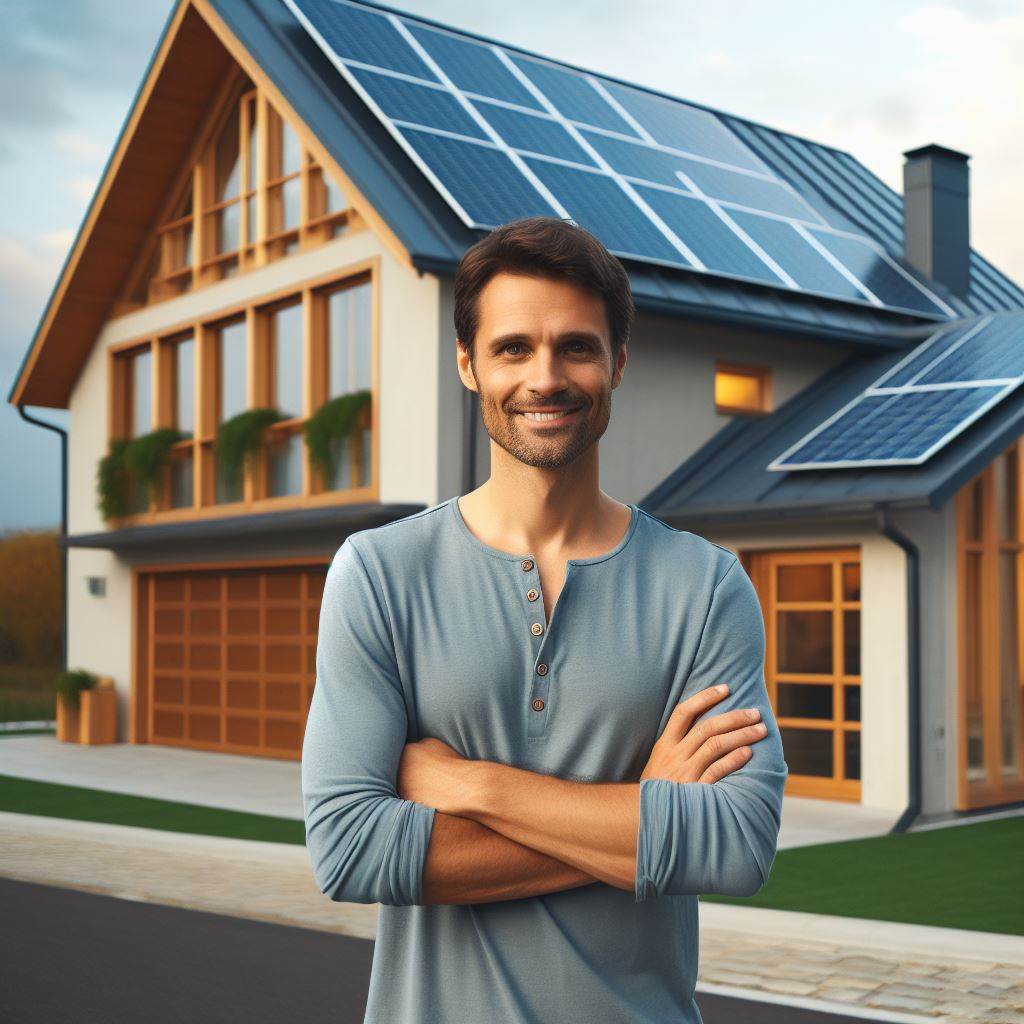Introduction
The significance of solar technology in the real estate industry cannot be overstated.
It represents a pivotal shift towards sustainable energy solutions, addressing both environmental concerns and long-term energy sustainability.
As the world grapples with climate change and seeks alternatives to fossil fuels, solar technology emerges as a beacon of hope, offering a renewable and clean energy source that reduces carbon emissions and mitigates the impacts of global warming.
The adoption of solar technology in new homes is experiencing a remarkable surge, indicative of a broader movement towards eco-friendly living and sustainable development practices.
Builders and developers are increasingly integrating solar panels, solar water heaters, and other solar-powered systems into their projects, recognizing the value they bring in terms of energy efficiency, cost savings, and environmental stewardship.
This trend is not limited to a particular region or demographic but is instead becoming a widespread phenomenon across the globe as more people prioritize sustainability and seek to reduce their carbon footprint.
As a result, solar-powered homes are becoming increasingly common in residential communities, ranging from suburban neighborhoods to urban high-rises, demonstrating the versatility and scalability of solar technology in meeting diverse housing needs.
Overall, the growing adoption of solar technology in new homes reflects a fundamental shift in the real estate industry towards more environmentally conscious and sustainable practices.
By harnessing the power of the sun to generate clean and renewable energy, homeowners can not only reduce their reliance on traditional energy sources but also contribute to a cleaner and healthier planet for future generations.
As solar technology continues to evolve and become more accessible, its role in shaping the future of real estate will undoubtedly become even more pronounced, ushering in a new era of sustainable living and development.
Read: Millennial Choices in Today’s Housing Market
The Benefits of Solar Technology in New Homes
Solar technology is revolutionizing the way homes are built and operated.
By harnessing the power of the sun, homeowners can enjoy a range of benefits, both for the environment and their wallets.
In this section, we will explore the advantages of incorporating solar technology into new homes.
A. Environmental Benefits
- Reducing carbon footprint: Installing solar technology in new homes is an effective way to reduce carbon emissions.
By using renewable energy sources like sunlight, homeowners can significantly decrease their reliance on fossil fuels, which contribute to climate change. - Utilizing renewable energy sources: Solar technology utilizes the most abundant and accessible renewable energy source on Earth: sunlight.
Unlike fossil fuels, sunlight is not depleted when used to generate electricity, making it a sustainable and environmentally friendly option.
B. Cost-effective Solutions
- Decreasing electricity bills: One of the greatest advantages of solar technology in new homes is the potential for long-term savings on electricity bills.
Once installed, solar panels generate electricity for free, reducing reliance on the grid and lowering monthly energy costs. - Government incentives and tax credits: To encourage the adoption of solar technology, many governments provide incentives and tax credits to homeowners who install solar systems.
These incentives can significantly offset the initial installation costs, making solar technology more affordable and attractive.
C. Increasing Property Value
- Appeal to eco-conscious buyers: With an increasing focus on sustainability, many homebuyers prioritize eco-friendly features when searching for a new home.
By having solar technology integrated into their houses, sellers can attract environmentally conscious buyers and potentially increase the property’s value. - Competitive edge in the real estate market: Homes equipped with solar technology have a competitive edge in the real estate market.
With the growing demand for energy-efficient and sustainable living, properties with solar panels often stand out among the competition, appealing to potential buyers looking for long-term cost savings and environmental benefits.
In fact, the benefits of incorporating solar technology into new homes are significant.
From reducing carbon emissions to providing cost-effective solutions and increasing property value, solar technology is paving the way towards a more sustainable and energy-efficient future.
As the demand for renewable energy grows, it is crucial for homeowners and builders to consider the advantages of solar technology when constructing new homes.
Read: US Home Design Trends: 2024’s Best Picks
Solar Technology Trends and Innovations in 2024
In recent years, solar technology has undergone remarkable advancements and innovations.
As we look forward to 2024, the integration of solar tech with smart home technology is set to revolutionize how we generate and consume solar energy.
A. Integration with smart home technology
Smart home technology has already made our lives more convenient and efficient.
In the context of solar energy, the integration with smart home systems brings new possibilities.
Remote monitoring and control systems allow homeowners to keep track of their solar power system’s performance and make adjustments as needed.
Through smartphone apps or online platforms, individuals can easily access real-time data, such as the amount of electricity generated and consumed.
This level of remote monitoring enables proactive management and optimization of energy usage.
Energy management optimization goes hand in hand with remote monitoring.
By analyzing energy consumption patterns and solar generation data, smart systems can automatically optimize energy usage.
This means that appliances and devices can be programmed to operate during times of maximum solar generation, minimizing reliance on the grid and maximizing self-consumption of solar energy.
Ultimately, this leads to cost savings and a more sustainable energy lifestyle.
Beyond the integration with smart home technology, solar panel efficiency is also expected to make significant progress in 2024.
B. Improved solar panel efficiency
Advancements in photovoltaic technology will contribute to the improved efficiency of solar panels.
Increased efficiency means that more sunlight can be converted into usable electricity.
Advancements in photovoltaic technology allow for the development of solar panels that can capture a broader spectrum of sunlight, thus enhancing their energy conversion efficiency.
This means that even in less optimal weather conditions, solar panels will still be able to generate significant amounts of electricity.
The increased energy production from more efficient solar panels will empower homeowners to generate more renewable energy.
This surplus energy can be utilized for various purposes, such as powering electric vehicles or selling excess electricity back to the grid.
Overall, improved solar panel efficiency contributes to a greener and more sustainable future.
In addition to maximizing energy production, the integration of battery storage solutions will play a crucial role in the solar industry’s progression.
C. Battery storage solutions
Battery storage systems offer a way to store excess solar energy for later use, providing greater flexibility and reliability in energy supply.
Storing excess energy allows homeowners to utilize solar power during periods when sunlight is insufficient or when demand exceeds generation.
This ensures a continuous supply of electricity even when solar panels are not actively producing.
Reducing reliance on the grid by leveraging battery storage solutions leads to increased energy independence.
Homeowners can rely on their stored energy, minimizing their dependence on traditional utility providers.
This not only provides peace of mind but also contributes to a more resilient and decentralized energy infrastructure.
In essence, the future of solar technology in residential homes is promising and filled with opportunities.
The integration of smart home technology enables remote monitoring and optimization, while improved solar panel efficiency and battery storage solutions increase energy production and independence.
As we move forward into 2024, these trends and innovations will shape the solar industry, making solar power an integral part of our lives and paving the way for a more sustainable future.
Read: Eco-Friendly Materials: US Building Shifts

The Future of Solar Tech in New Homes
A. Growing demand and market trends
The future of solar technology in new homes looks promising due to the growing demand and market trends.
Consumers are increasingly embracing sustainability and are actively seeking energy-efficient solutions for their homes.
This has led to a rising demand for solar technology in new constructions.
Additionally, government regulations and energy policies are incentivizing the integration of solar panels and related technologies in residential buildings.
B. Potential challenges and barriers
Despite the promising future, stakeholders must address potential challenges and barriers to ensure sustained growth and success.
High initial installation costs present a significant obstacle for solar technology adoption in many areas, including residential and commercial sectors.
While the long-term savings on energy bills can offset these costs, many homeowners might still find it challenging to afford the upfront investment.
Additionally, perception and misinformation about solar technology might create doubts and reluctance among potential adopters.
C. Potential solutions and advancements
However, there are potential solutions and advancements that can address these challenges.
Continued research and development efforts in the field of solar technology can lead to innovations that make it more efficient and affordable.
Advancements in panel design, storage systems, and overall integration can help reduce costs and increase the overall efficiency of solar tech in new homes.
Additionally, collaborations between solar technology providers and utility companies can help overcome infrastructure and grid compatibility challenges, ensuring seamless integration and optimal functionality.
In short, the future of solar technology in new homes is promising.
The growing demand for sustainability, driven by consumer preferences and government regulations, sets a strong foundation for its continued growth.
Address challenges like initial installation costs and perception barriers to overcome obstacles in implementing solutions effectively.
Ongoing research, development, and collaborations with utility companies hold the key to unlocking the full potential of solar technology in new homes.
Read: Tiny Homes Surge: A 2024 US Market Review
Conclusion
A. Recap of the benefits and trends in solar technology for new homes
Solar technology for new homes is a rapidly growing trend, offering numerous benefits.
It reduces energy costs and environmental impact, enhances property value, and provides self-sufficiency.
Advancements in solar panel efficiency, battery storage, and smart home integration have made solar technology more accessible and efficient.
Moreover, the increasing adoption of solar incentives and policies by governments worldwide further supports the integration of solar technology in new homes.
B. Encouragement for real estate professionals and buyers to embrace solar tech
Real estate professionals should recognize the value that solar technology adds to properties and promote its benefits to potential buyers.
Investing in solar technology not only saves money in the long run but also aligns with sustainable living practices and attracts eco-conscious buyers.
Buyers should consider the long-term advantages of solar technology, such as lower utility bills, energy independence, and reduced carbon footprint.
C. Final thoughts on the potential of solar technology in shaping the future of the real estate industry
Solar technology has the potential to revolutionize the real estate industry by providing innovative solutions to energy consumption and transforming homes into environmentally friendly spaces.
As the demand for sustainable living and green homes continues to rise, integrating solar technology will become a standard practice in the construction of new homes.
The future of real estate lies in embracing solar technology as a key feature, not only for its economic and environmental benefits but also for meeting the needs and desires of conscious homebuyers.




